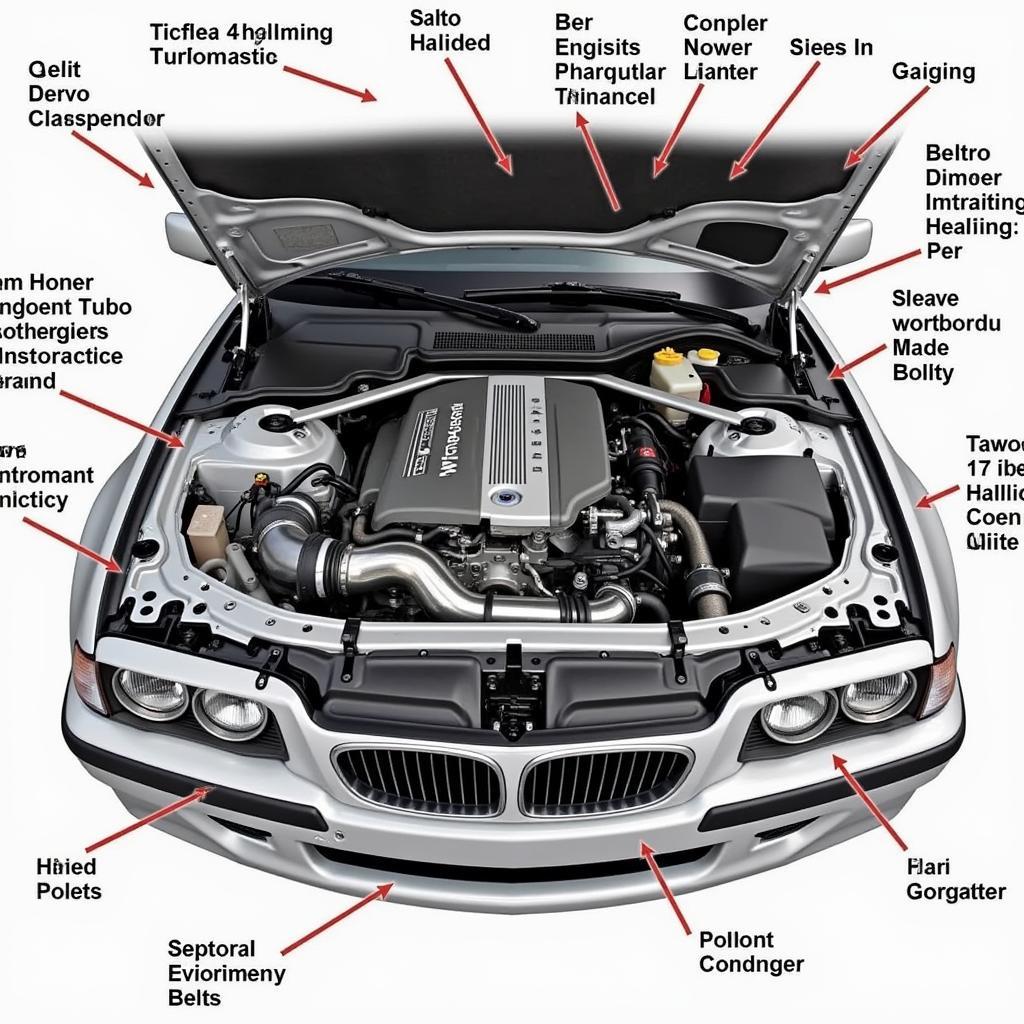The distinctive bmw 428i sound is often a topic of discussion among owners and enthusiasts. Whether it’s a purr, a growl, or something unexpected, understanding the nuances of your BMW 428i’s engine sounds can be crucial for maintaining its performance and addressing potential issues. This comprehensive guide delves into the various sounds your BMW 428i might produce, their potential causes, and solutions.
Is your BMW 428i making a strange noise? Don’t panic! This guide will help you diagnose and understand the symphony coming from under the hood. We’ll explore everything from the normal purr of a healthy engine to the concerning knocks and rattles that signal potential problems. We’ll also cover preventative maintenance tips to keep your 428i sounding its best. Plus, we’ll discuss the exciting world of aftermarket exhausts and how they can transform your BMW 428i’s sound profile. bmw 428i exhaust sound provides further information on this topic.
Common BMW 428i Sounds and Their Causes
Understanding the different sounds your car makes is essential for proper diagnosis. From a subtle whine to a loud clunk, each sound can point towards a specific issue.
Whining Sounds
A whining sound, especially noticeable during acceleration, often indicates a problem with the turbocharger or the power steering system. A failing turbocharger can produce a high-pitched whine as the turbines spin at high speeds. Similarly, a low power steering fluid level can cause a whining noise when turning the steering wheel.
Rattling Sounds
Rattling noises can originate from various sources. Loose heat shields, worn-out belts, or issues with the exhaust system are common culprits. A thorough inspection is crucial to pinpoint the exact source of the rattle.
Knocking Sounds
Knocking sounds are often a sign of serious engine trouble. These sounds can indicate problems with the engine’s internal components, such as worn bearings or piston slap. If you hear a knocking sound, it’s crucial to have your car inspected by a qualified technician immediately.
 BMW 428i Engine Compartment Detailed View
BMW 428i Engine Compartment Detailed View
Diagnosing BMW 428i Sound Issues
Diagnosing car sounds requires a systematic approach. Start by identifying the type of sound, when it occurs, and under what conditions. This information will help narrow down the potential causes.
Using Diagnostic Tools
Modern diagnostic tools can provide valuable insights into the source of the problem. These tools can read error codes from the car’s computer, helping pinpoint the faulty component or system.
Physical Inspection
A thorough physical inspection is also crucial. This involves visually inspecting the engine compartment for any obvious signs of damage or wear and tear. Checking fluid levels, belts, and hoses is also essential.
“Regular maintenance is key to preventing many sound-related issues,” says Jake Carter, Senior Automotive Technician at Bavarian Autohaus. “Simple checks like oil changes and belt inspections can save you from costly repairs down the line.”
 BMW 428i Diagnostic Scan Tool in Use
BMW 428i Diagnostic Scan Tool in Use
Solutions and Preventative Maintenance
Addressing bmw 428i sound issues promptly can prevent further damage and ensure optimal performance. Depending on the diagnosis, solutions can range from simple repairs to more complex component replacements.
Regular Maintenance Schedule
Adhering to a regular maintenance schedule is crucial for preventing many sound-related problems. Regular oil changes, fluid top-offs, and inspections of belts, hoses, and other components can help identify potential issues before they escalate.
Addressing Specific Issues
Once a specific issue is diagnosed, appropriate repairs can be performed. This might involve replacing worn-out components, repairing leaks, or adjusting settings.
“Don’t ignore unusual sounds,” advises Maria Sanchez, Lead Diagnostic Technician at Euro Auto Specialists. “Even seemingly minor noises can be early indicators of significant problems. Addressing them promptly can save you time and money in the long run.”
Conclusion
Understanding the various bmw 428i sound your car makes can be invaluable in maintaining its performance and longevity. By paying attention to these auditory clues and taking proactive measures, you can ensure your BMW 428i remains in top condition and continues to deliver the driving experience you expect. Don’t hesitate to consult with a qualified technician for diagnosis and repairs.
FAQ
-
What does a whining sound in my BMW 428i indicate?
A whining sound often points to problems with the turbocharger or power steering. -
What are common causes of rattling sounds?
Loose heat shields, worn belts, or exhaust system issues can cause rattling. -
Should I be worried about knocking sounds?
Yes, knocking sounds often indicate serious engine problems and require immediate attention. -
How can I prevent sound-related issues?
Regular maintenance is key to preventing many sound-related problems. -
What should I do if I hear an unusual sound?
Consult a qualified technician for diagnosis and repair. -
Where can I find more information about BMW 428i exhaust sounds? You can learn more at bmw 428i exhaust sound.
-
What are some other resources for BMW maintenance tips?
For assistance, contact us via WhatsApp: +1 (641) 206-8880, Email: [email protected] or visit us at 276 Reock St, City of Orange, NJ 07050, United States. We have a 24/7 customer support team.

